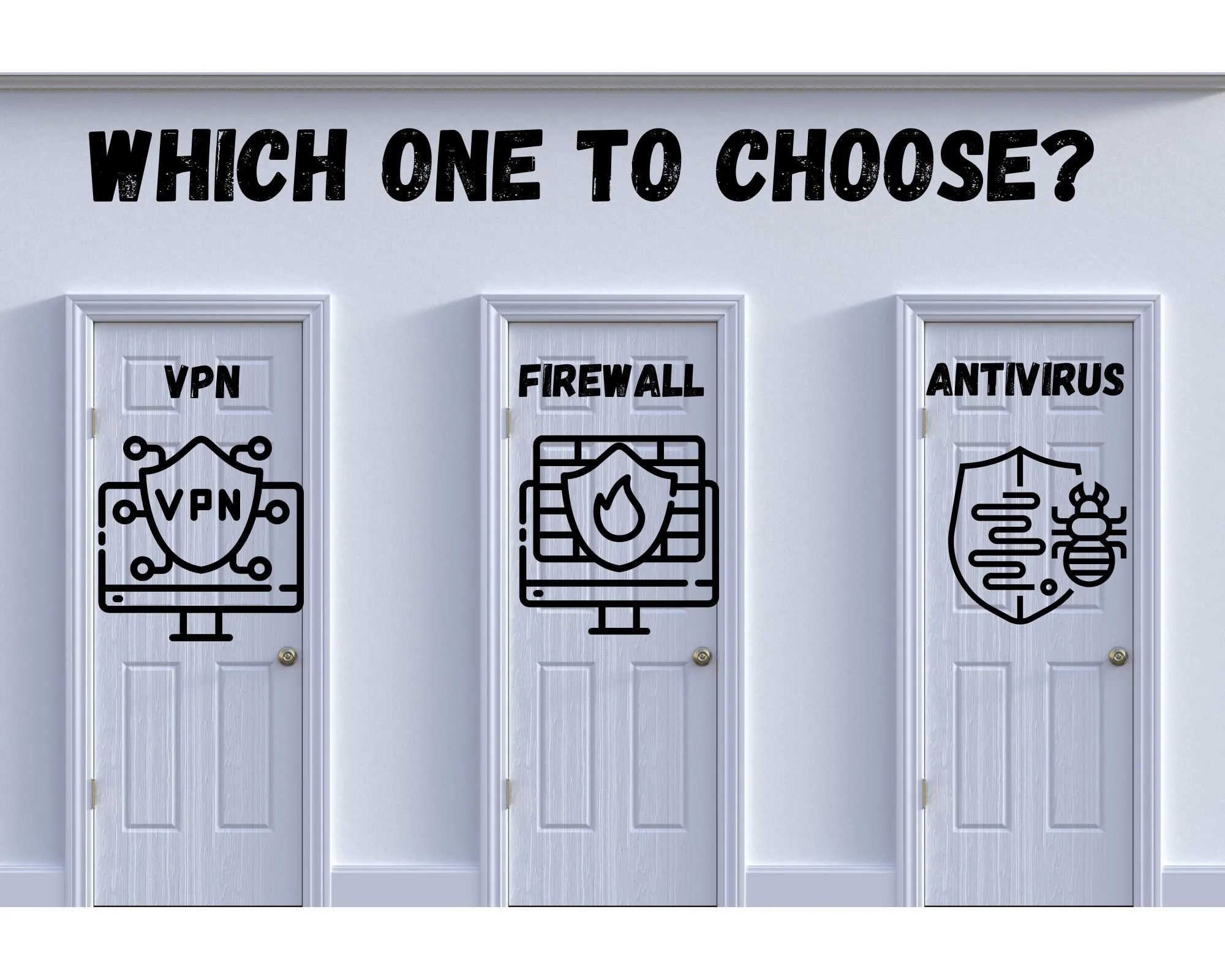VPN vs Firewall vs Antivirus: What’s the Difference?

You’re probably wondering what the differences are between a VPN, firewall, and antivirus. Or maybe you’re confused about the one you should get.
You’re not alone!
Many users can’t tell them apart and, more often than not, end up with the wrong pick. But guess what? We’re here to save you all that trouble.
Find below an explanation of what they arere, how they work, and when to use them.
Without further ado, let’s begin.
VPN vs firewall vs antivirus – What’s the difference?
Right off the bat, a VPN is an app for hiding IP addresses and encrypting traffic to maximize digital privacy. In contrast, a firewall is a barrier that protects the user’s device against cyber threats. An antivirus, on the other hand, is software for blocking and removing virus and malware infections.
In a nutshell:
- While a VPN anonymizes your traffic, it can’t manage outgoing/incoming connections like a firewall.
- You can manually program a firewall to block malicious sites on the internet. But it can’t bypass geo-restrictions the same way a VPN does.
- Unlike a firewall, an antivirus automatically blocks suspicious websites and malware. However, it can’t encrypt your traffic against spying.
- A VPN and firewall may come in-built, but an antivirus requires software installation.
Here’s a quick roundup of their differences in the illustration below:
It’s time to go deeper!
VPN
A virtual private network (VPN) is a service that helps protect your privacy on the web. It encrypts your traffic and routes it via secure remote servers.
Another thing it does is hide your internet service provider (ISP) address, which identifies your device. In exchange, it assigns you a unique internet protocol (IP) number to keep your online activity anonymous.
IP spoofing and traffic encryption make your connection virtually impossible to track. That way, no one can tell what you’re doing on the web.
A VPN is ideal for evading government surveillance and internet censorship. So, consider getting one if your security and privacy are at threat.
But wait, there’s more.
VPNs work great at bypassing geo-blocked services unavailable in your location. All you need to do is choose a server in a supported region to unlock the restricted content.
Sadly, a VPN can’t protect you from threats on the internet. And that’s where the firewall comes in.
Firewall
A firewall is a security toolkit for monitoring incoming and outgoing traffic on your device. It can come hard-coded on the machine or through the installation of a third-party application.
Firewalls do a great job of allowing and restricting internet access for installed programs on your system. It’s accomplished through inspecting and filtering packet data to enforce the applicable rule.
You can also configure it to block access to unwanted online resources. These can range from ordinary websites to sites that host harmful content.
A firewall protects your device from threats present on the internet. Likewise, it’s ideal for filtering traffic at workplaces and institutions.
On the downside, it offers basic-level security, exposing you to web viruses and malware. For these reasons, you need an antivirus for your peace of mind.
Antivirus
An antivirus is a software designed to detect and remove malicious programs on your system. Some common examples include viruses, malware, spyware, worms, adware, ransomware, etc.
It works by monitoring the behavior of files and apps on your system. Any flagged items will be subject to quarantine or deletion, or both.
The ability to continuously update itself with newer rules is the beauty of an antivirus. That’s because it must remain effective at stopping deadlier threats emerging daily.
And the best part:
Some antivirus comes in-built with a VPN and firewall for your convenience. Bundling them together ensures you don’t break the bank to protect your device.
VPN vs firewall vs antivirus – Which one is better?
As you’ve seen, VPN, firewall, and antivirus are different and serve distinct functions. One common thing about them is they protect computing environments in various capacities.
You need to consider your needs before choosing the right solution. If it’s privacy and bypassing geo-blocks, a VPN will impress you. For basic protection and managing network connections, consider getting a firewall. But an antivirus surely stands out for complete protection against viruses, malware, and suspicious websites.



User forum
2 messages